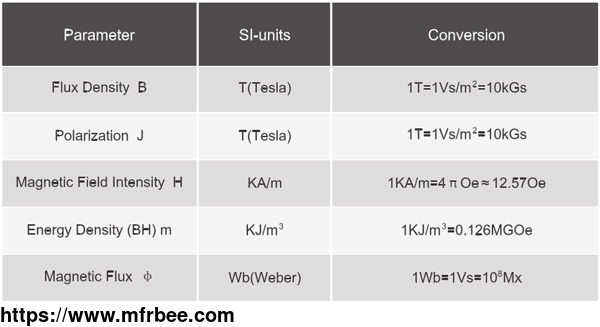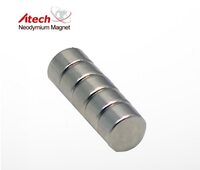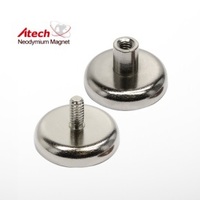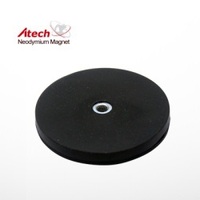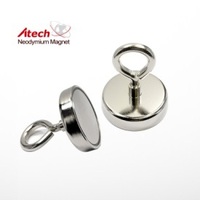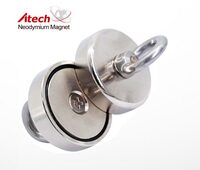Sintered Neodymium Magnets
Quick Detail
- Minimum order:1
Specifications
Sintered neodymium magnet is the strongest magnetic material commercially available today. It is largely made of alloy of neodymium, iron and boron, and the chemical formula is Nd2Fe14B. Sintered
NdFeB neodymium magnet exhibits high magnetic energy product in small size with high coercive forces. Examples of applications include permanent magnet motors, loudspeakers, magnetic separators,
wind power generators, computer hard drive, and MRI devices.
For more technical information of our sintered neodymium magnet, please refer to the sections of Technological Advantages, Demagnetization Curve, Grades, Magnetic Properties, Physical Properties,
Magnetic Parameters, Surface Treatment, Magnetization Orientations.
Technological Advantages
High Coercive Force
Highest Intrinsic coercive force Hcj≥35kOe
High Consistency
CPK of Remanence (Br) and Intrinsic coercive force (Hcj)>1.67
Low Reversible Temperature Coefficient
αBr=-0.08%/℃, βHcj=-0.4%/℃
Low Weight Loss
130℃, humidity 100%, vapor pressure 2.7bar, 20days, average weight loss<2mg/cm2
Demagnetization Curves of Sintered Neodymium Magnet
Sintered Neodymium MagnetsSintered Neodymium Magnets
N52 Demagnetization Curves at Different Temperatures N50M Demagnetization Curves at Different Temperatures
N48H Demagnetization Curves at Different TemperaturesN45SH Demagnetization Curves at Different Temperatures
N48H Demagnetization Curves at Different Temperatures N45SH Demagnetization Curves at Different Temperatures
N40UH Demagnetization Curves at Different TemperaturesN38EH Demagnetization Curves at Different Temperatures
N40UH Demagnetization Curves at Different Temperatures N38EH Demagnetization Curves at Different Temperatures
Grades
The Grade of a magnet generally indicates how \"strong\" a magnet material is, which is measured by the Maximum Energy Product. The energy product is commonly specified in units of Gauss Oersted.
The higher the grade the \"stronger\" the magnet. The grade also tells the temperature rating of a magnet material. Neodymium magnets have different heat tolerances which determine their maximum
working temperature. As the heat tolerance increases the maximum available flux density decreases.
Magnetic Properties of Sintered Neodymium Magnet
Sintered Neodymium Magnets
Notes:
1. The above-mentioned data of magnetic parameters and physical properties are given at room temperature(20℃±2).
2. The maximum service temperature of magnet is changeable due to the ratio of length and diameter, coating and environmental factors
Physical Properties
Sintered Neodymium Magnets
Magnetic Parameters
Sintered Neodymium Magnets
Surface Treatment
As Neodymium magnet is prone to corrosion, it is usually preferable for the magnet to be coated for protection. Among a variety of options for coatings, nickel and nickel-copper-nickel are the most
commonly used, making the magnet more corrosion resistant and durable.
Sintered Neodymium Magnets
Magnetization Orientations
Magnets can be delivered magnetized and un-magnetized. Some production methods require the magnets being incorporated into assemblies in a un-magnetized state and magnetized later once the assembly
is completed. There are various magnetic orientations available for different shapes of magnets.
Plates & Blocks
Sintered Neodymium Magnets
Discs & Cylinders
Sintered Neodymium Magnets
Rings & Tubes
Sintered Neodymium Magnets
Arcs&Segments
Sintered Neodymium Magnets
